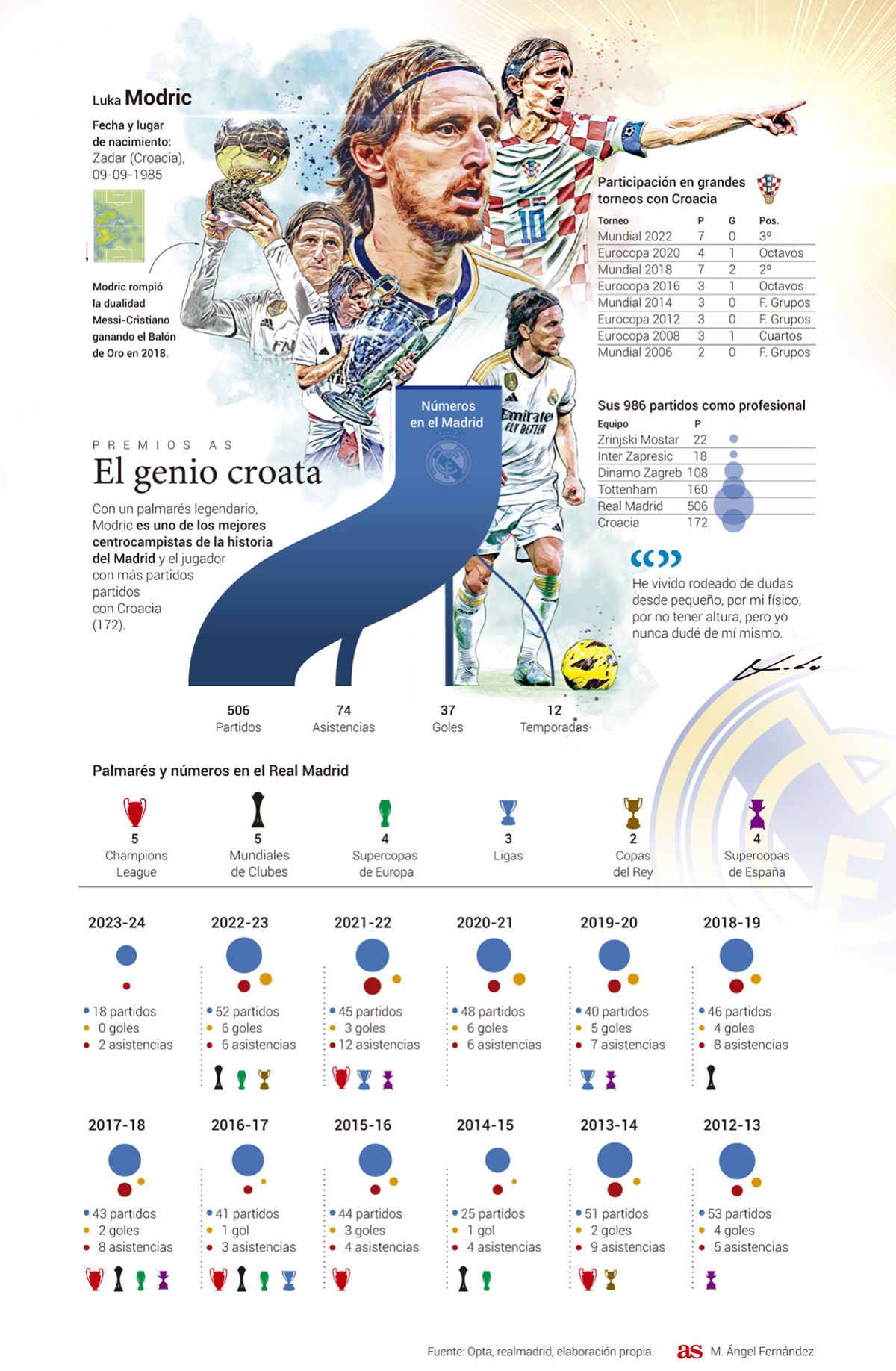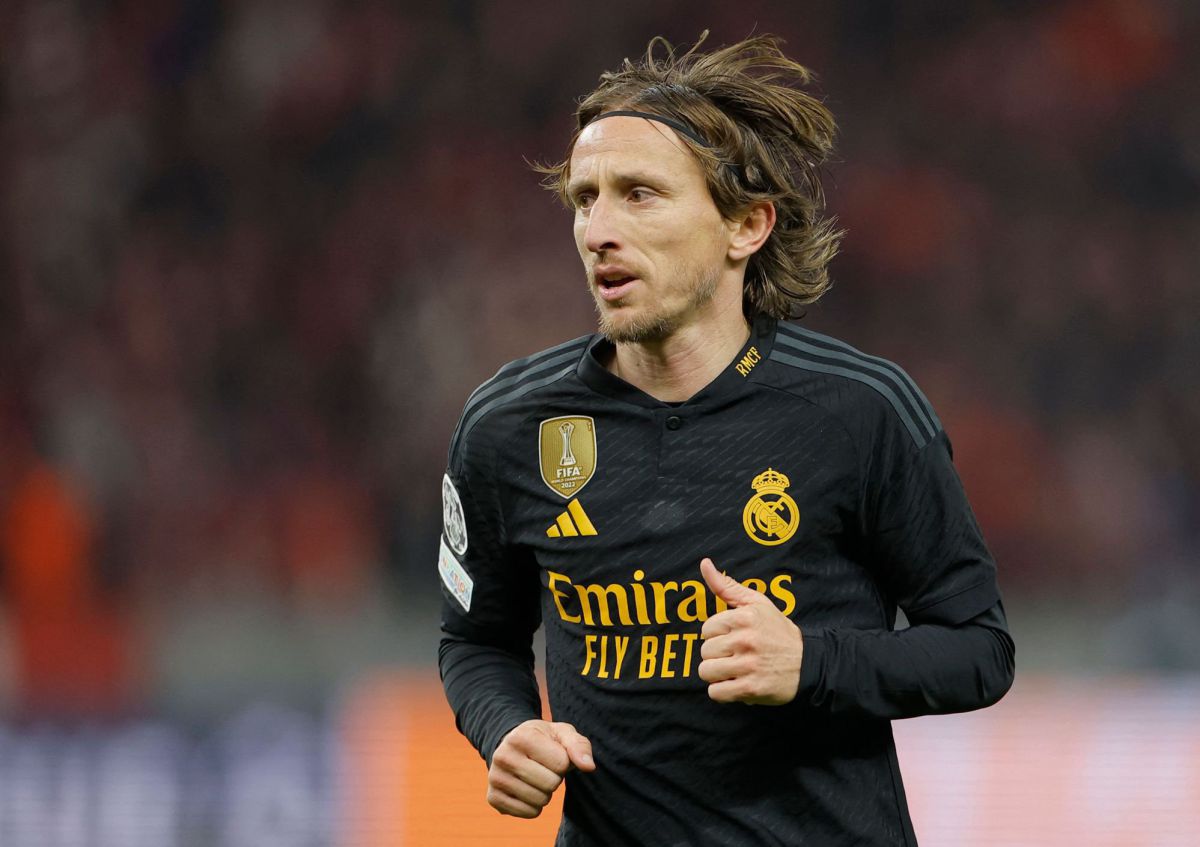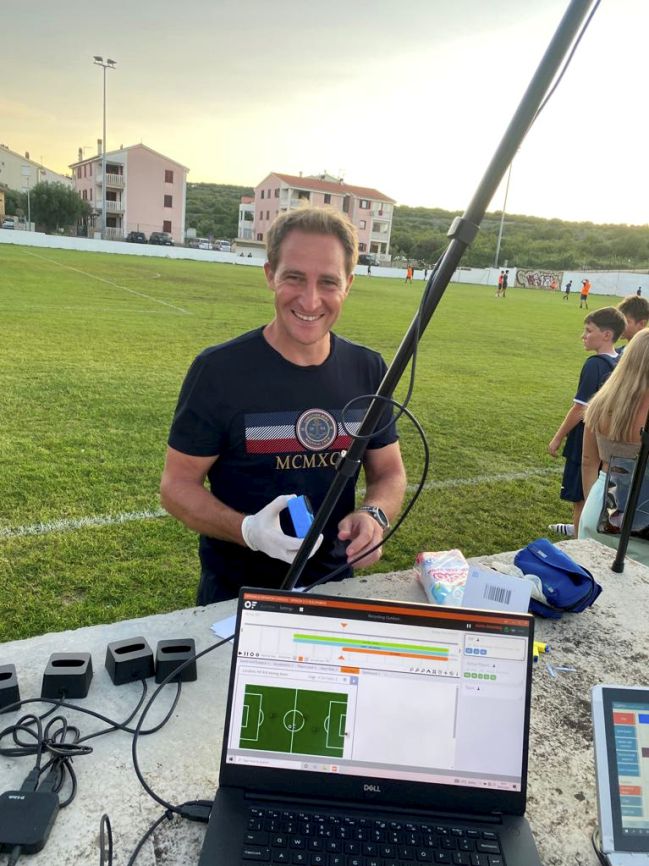By
It’s July 21, 2012, Heathrow Airport, London. The Tottenham players, scattered around the departure terminal, finish checking in their luggage. Among them are Hugo Llorís, a young bale (23), Van der Vaart and Harry kane. Coach Villas Boas closes the anarchic line of footballers. Nervous, he looks at his watch again and again and whispers in Luis Martins’ ear, his second. The team is about to leave for the US for the summer tour and Modric is missing. The Croatian has been in rebellion for a couple of days, but no one expected him to be able to take this step, leaving the team, which will be in America for 15 days, stranded. Modric is no child. He is 27 years old and is already a figure in the Premier League, in which he has already played 160 games. Before, 125 at Dinamo Zagreb.
The days prior to Modric’s signing for Madrid were full of tension. The Croatian had decided to fulfill his dream and nothing was going to stop him. Not even the belligerent attitude of Daniel Levy, president of Tottenham, which is making negotiations with the white entity difficult. That sit-in at Heathrow cost the Croatian a daily fine of 19,000 euros until, as was logical, his signing for Madrid was announced. It was August 27. He signed for five seasons and the club paid €30M plus five in variables.
“It has been a long process, but I am finally here,” Modric reasoned before the press in his presentation. “My challenge is to make a place for myself in the starting team and win titles,” he added candidly. The future had something very different in store for him. Modric is the eternal ten and his figure has dominated the Real Madrid midfield, with Kroos as a partner, to win 23 titles, including five European Cups and three Leagues. It was he, too, who managed to change the hegemony of Cristiano and Messi in the Ballon d’Or. He won it at the age of 33, in 2018.
The figure of Modric emerges from among all the signings that José Mourinho proposed for Real Madrid. Khedira was too diesel for the team’s idiosyncrasy, Özil too fleeting, Adebayor too exotic, Coentrao too chaotic, Altintop too little… Mourinho, who was facing his third season in Madrid, thought that the team lacked development, and the Croatian had to make a place for himself between Xabi Alonso, Khedira, Lass Diarra, Essien or Granero.

But Modric was not going to waste his opportunity. In that first season he already played 53 games, 36 of them as a starter and 23 complete games. Since then he has been the undisputed starter and only this season, with 38 years behind him, The status that he has brilliantly maintained for more than a decade at Real Madrid is beginning to be discussed.
Modric is living history of the beautiful sport. He has played in four World Cups (2006, 2014, 2018 and 2022) and is going to play in his fifth European Championship after those of 2008, 2012, 2016 and 2020. In total there are 986 games as a professional, 506 of them wearing the Madrid shirt. He is in the top-15 of players who have been internationalized with their national team the most times (172). In that ranking he is the fourth European behind Cristiano (250), Ramos (180) and Buffon (176). He is the second oldest player to have played an official match for Real Madrid only behind Puskas. He is in the top 20 of footballers with the most appearances (121) in the Champions League… If there is a deserved lifetime achievement award, it is his. It is Modric, the eternal ten, the Croatian genius.

ODD ANDERSEN (AFP)
Modric continues to tirelessly pursue expanding his legend, regardless of his age. At 38 years old, he is still a vital player for Real Madrid and the great captain of the Croatian national team, in which he is a regular starter. He has the Euro Cup in his pocket, and those close to him confess that he is keeping an eye on the next 2026 World Cup in the United States, Mexico and Canada. Everything will depend on how you find yourself season by season. “I want to renew because I deserve it, not because they give it to me,” Modric said recently in reference to Real Madrid. But it is a rule that also applies to the selection.
The secret of Modric’s longevity is none other than work. Daily training, 365 days for several years, keeps him in a linear and more than optimal state of form even as the years go by. A special therapy that is programmed by Vlatko Vucetic, the Croatian fitness guru, and that Modric complies to the letter beyond the training sessions he does with Real Madrid in Valdebebas.
Vlatko Vucetic is a professor at the Faculty of Kinesiology at the University of Zagreb and head of the Center for Sports Diagnostics, where hundreds of the country’s elite athletes from 50 different specialties pass. He currently works as a personal trainer for more than twenty professional soccer players, among whom is Luka Modric, and he is also a teacher at UEFA A, B and Pro Levels of the Croatian national football coaching academy…
Vlatko Vucetic, Luka Modric’s personal coach.
AS DIARY
Who really is Vlatko Vucetic?
I have my own basic principles in the preparation of athletes, especially for tennis players and soccer players, who are the bulk of my clients. I was champion in Croatia in athletics, in the middle distance specialty, and for more than 15 years I experienced firsthand the process of having to train daily. I can understand how the player feels after a hard and exhausting workout. Now I work with more than 20 footballers, some veterans, like Luka (Modric), although I also like to train the youngest players.
What is your method like?
It is born from a complex diagnostic investigation. I measure footballers with more than 40 morphological parameters, that is, muscles, bones, etc. We also talk about daily habits and lifestyles. That is first. We look at body composition, we look at motor skills for explosiveness, flexibility, jumping, sprinting, agility, strength and power, muscular resistance bench…
Conduct an in-depth examination of the footballer.
Sometimes players’ physical ability can be improved simply by changing how they accelerate, how they place their feet on the ground, or at what angle they step. By doing that you can be faster or change direction faster. But I also measure oxygen, that is my doctoral thesis, and I assess ‘energy capacity’. I’m the best at this.
What about the mental aspect?
Another important parameter, character. I do a preliminary test of 16 questions to the footballer about his personality, it is very interesting. And each of them chooses an animal depending on how they feel. Once or twice a week I send the photo of this animal to the footballer so that he can wake up with it before a match, especially if it is important. And I put that animal as the player’s last name… It’s a cognitive question.
Does each player identify with an animal?
I put this animal on my phone. Every day when I open it, I see the name, animal, and character of each of my athletes. It’s really important because each of these players are different. I understand that it is impossible for a coach to treat the 20 players on his team differently, but I think that is really important.
What animal does Modric identify with?
It’s a personal matter.
What else do you work on?
Another important parameter is motor intelligence for football, especially for midfielders. How quickly he makes decisions, how quickly he solves problems… Luka is one of the best in the world at that. He sees the game with an open mind and before having the ball he has a different vision of the field than other players. Modric sees three or four different solutions and his brain spontaneously analyzes the situation of many players around him, and then quickly makes a decision. Sometimes he thinks faster than his teammate and, where he puts the ball, there is no one (laughs).
Do you work on any other parameters?
The social character of the footballer, how he develops in his environment and how he projects himself.
I understand…
The eight aspects on which I work, in summary, are: health status and lifestyle, morphological parameters, motor skills, motor knowledge, energy capacity, aerobic and anaerobic capacity, cognitive factors and intelligence in decision making and, therefore, last, social and economic status, the family…
Is football today only for athletes?
It is radically different from 20 years ago. Think of Robert Prosinecki, he was one of the best. But now football is faster, more energetic, more powerful… Nowadays, most players have individual conditioning trainer. Some clubs don’t like that, but I don’t agree. I think it is impossible for a club to have enough coaches so that each player can do an individual program. But it’s something really complicated.
It is the future?
I know this because I’m a college teacher and out of a hundred conditioning coaches, maybe only five to 10 are good for football players. Each sport has its peculiarities.
What role does nutrition play in all this?
I know a lot about nutrition. I passed a sports nutrition exam and have read many books. But I don’t know enough. I know nothing! (laughs). My knowledge of nutrition is almost zero when compared to my knowledge of conditional training. And I never talk to my soccer players about nutrition. For nutrition I have looked for the best, Dolores Dravinec. I always say, “ask Dolores, not me.”
What does a footballer have to do with you, then?
We plan day by day. 10 years ago I did it a month at a time, then a week at a time… But in the last ten years I work day to day, because things change quickly. Sometimes it happens with Luka, we change on the fly, or he decides, because we have been working together every day for almost seven years. Maybe Luka is without training ten days a year at most. This summer I sent him a program to play tennis because he likes it, or exercises to swim in the sea and things like that. He is a very hard worker, he is absolutely a player and a person who lives for football, for his team, he is totally different from the others. He wants to organize the players and for the team to play well. He is happier when the team is playing well, not him. And he concentrates on himself and on his body, he works every day, sometimes in the morning. Many of my players work immediately after waking up, in their pajamas, for 15 or 20 minutes. I myself do squats while brushing my teeth. Then push-ups, and so on after I woke up. And most of my players do the same. You can work even when you are sick.
What type of exercises do they do?
Each preparation has elastic bands. The muscle is elastic! For me, for you, for my father, who is 81 years old… For everyone, elastic bands are the best way to train. It is the best way to avoid injuries. If you look at Modric’s last seven or eight years, he has had almost zero injuries. It’s because of his preparation, because he’s focused on training, focused on prevention, focused on lifestyle…
Can you play until you are 40 years old?
By training in this way and following a nutrition plan, like Cristiano Ronaldo or Ibrahimovic, Luka and other players, it is possible. They are footballers who really focus on their bodies.
